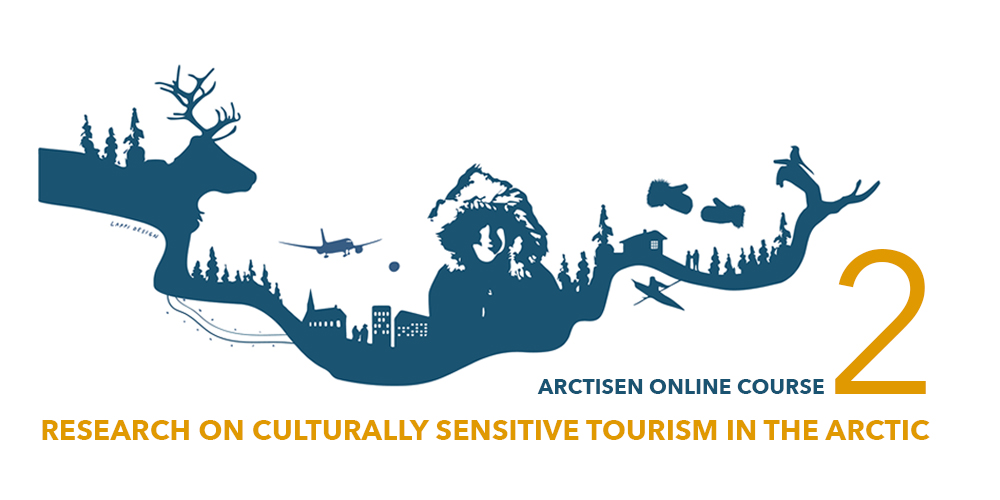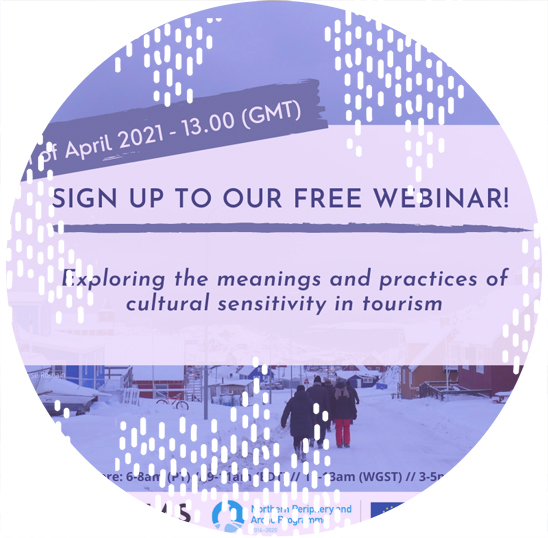
Until recently, cultural sensitivity has not been widely used or conceptualised in Tourism Studies. The first course titled ‘Cultural Sensitivity in Arctic Tourism’ provided examples of culturally sensitive business innovations, product development, digitalization, marketing and cultural sensitivity in tourism companies.
This in-depth course builds on the learned lessons of the first course. Nevertheless, it is possible to begin your studies directly from this course ‘Research on Culturally Sensitive Tourism in the Arctic’ without completing the other course. The main purpose of this self-study online course is to help you to enhance your theoretical and conceptual understanding of cultural sensitivity. You will gain new knowledge through readings, quizzes, interactive padlets, and self-reflective exercises.
Target groups: Tourism workers, students, and everyone else interested in gaining a better theoretical understanding of cultural sensitivity.
Credits: 1 ECTS (27 hours of self-study work). After the course, you will receive a certificate to show that you have passed the course.
Content: Conceptual framework of cultural sensitivity, videos, articles and exercises.
Learning objectives: After completing the course, you:
1) will have gained an overview of previous research on cultural sensitivity in tourism,
2) will have better conceptual understanding of cultural sensitivity in tourism settings, and
3) will be able to recognise, describe and reflect on the challenges and possibilities related to cultural sensitivity in tourism.
If you experience any technical issues, please send an email to eOppimispalvelut@luc.fi and describe the problem.

1. INTRODUCTION TO THE COURSE
This chapter provides you with information about this course. You will receive instructions on how to move around the course and an introduction to its background.
Welcome!

2. CONCEPTUAL FRAMEWORK OF CULTURAL SENSITIVITY IN TOURISM
This chapter introduces a conceptual framework of cultural sensitivity in tourism. It helps you to gain understanding about previous research and the approach developed through cooperation within the ARCTISEN project.

3. LEGACIES OF ETHNOCENTRISM IN ARCTIC TOURISM
This chapter focuses on ethnocentric practices of assimilation, appropriation and stereotyping in Indigenous tourism, and in Arctic tourism specifically. It helps you to reflect on and gain further understanding about these kinds of challenges of insensitivity within tourism development.

4. CULTURALLY SENSITIVE ORIENTATION IN ARCTIC TOURISM
This chapter focuses on ethnorelative practices of respect, recognition and reciprocity in Indigenous tourism and in Arctic tourism specifically. It helps you to reflect on and gain further understanding about the possibilities of sensitivity within tourism development.

5. ONGOING DISCUSSIONS ON CULTURAL SENSITIVITY IN TOURISM
This chapter concentrates on ongoing discussions and debates around the notion of cultural sensitivity in Arctic tourism. It welcomes you to join these discussions and to reflect on your ideas and thoughts about the questions at hand.

CONGRATULATIONS!
You have now reached the end of the course. How do you feel now?
Take the final steps and your course is complete!

